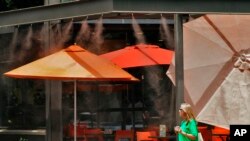A prolonged heat wave blanketed a swath of the U.S. stretching from California to South Florida on Wednesday, with forecasters expecting temperatures that could shatter records in parts of the Southwest in the coming days.
The National Weather Service issued excessive heat advisories, watches and warnings for areas where about 100 million Americans live. The sweltering conditions are expected to worsen over the weekend and continue into next week.
While stifling temperatures gripped many parts of the country, Vermont and other Northeastern states barely started cleaning up from historic flooding in recent days when the National Weather Service forecast more heavy rainfall across parts of New England, where rivers and streams are running high.
Floodwaters turned the Vermont state capital of Montpelier into a swirling, brown waterway, damaged roads and may have compromised the city's water supply. Officials told the city's 8,000 residents to boil their water before using it until further notice.
Extreme weather also threatened the Chicago area, which was pounded by severe thunderstorms with a risk of tornadoes, the weather service said. The National Weather Service reported at least four tornadoes touched down in the greater Chicago area.
The growing frequency and intensity of severe weather across the U.S. is symptomatic of global, human-driven climate change, experts in the field say.
Grim record awaits Phoenix
The Southwest was bracing for potentially deadly heat, with much of the area under an excessive heat warning.
Phoenix posted its 13th straight day with a temperature of at least 43 Celsius (110 Fahrenheit), with forecasts predicting the city next week will break its record of 18 straight days over 110, set in June 1974.
Moreover, the overnight lows are holding above 32C (90F), offering little relief.
"The heat is going to be expanding across California, Nevada, Arizona and all the way into West Texas into this weekend, and the core of the strongest heat seems to be setting up for Friday through Monday. So we'll be looking at records," said Tom Frieders, warning coordination meteorologist with the National Weather Service in Phoenix.
At the family-owned Six Points Hardware store in Phoenix, fans and air conditioners have been flying off the shelves, said store manager Drew Materniak.
The heat means "business is good," he said, noting the biggest seller has been large cooling fans, sold mostly to businesses like auto shops that do not have air conditioning.
"Just stay inside man, just stay inside," was Materniak's advice for dealing with the heat.
Las Vegas peaked at 42C (108F) on Wednesday and was forecast to match its all-time high mark of 47C (117F) on Sunday, the weather service said.
Cooler air blocked
A ridge of stagnant air parked in the atmosphere was causing the excessive temperatures, said Ashton Robinson Cook, a forecaster with the weather service's Weather Prediction Center. The mass blocks cooler air and storm systems from rolling through the area, so it is "just full sun and heat," he said.
In Texas, where temperatures reached the upper 90s and topped 37C (100F) on Wednesday, the heat index will make it feel like 46C (114F) in some places through the weekend. Warm ocean water is causing the moist, humid air over much of the state that drives the heat index higher, Cook said.
In a cooling center in the West Texas city of Lubbock, where the temperature rose to 36C (96F) by midday, Courtney Martin, 41 and homeless for the past two weeks, sat quietly inside a public library doing needlepoint, keeping cool and staying hydrated with free bottles of water.
"I'm in here to beat the heat," said Martin, who recently moved to Lubbock from Michigan and is not accustomed to the high temperatures. "I don't know what I'd do without the libraries as cooling centers."
Hannah Stewart, director of Lubbock's library system, said hundreds of people have sought refuge from the hot weather in the main branch library alone over the past two weeks.
"We're doing part of our duty to serve the community during this really horrendous heat wave," Stewart said.





